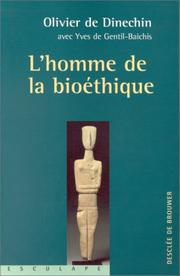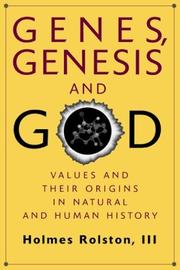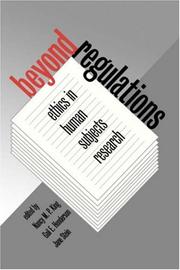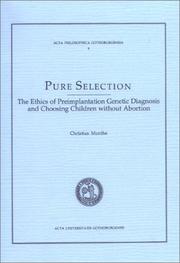| Listing 1 - 5 of 5 |
Sort by
|

ISBN: 222004453X 9782220044538 Year: 1999 Publisher: Paris Desclée de Brouwer
Abstract | Keywords | Export | Availability | Bookmark
 Loading...
Loading...Choose an application
- Reference Manager
- EndNote
- RefWorks (Direct export to RefWorks)
Le champ de l'éthique biomédicale ne cesse de s'élargir du stade embryonnaire de la vie humaine jusqu'à sa fin, sans omettre le génie génétique, les greffes d'organe et les neurosciences. Le P. O. de Dinechin, membre durant huit ans du Conseil consultatif national d'éthique en France, s'exprime ici en moraliste catholique informé des données scientifiques, des implications morales et de l'état des opinions. Le titre de l'ouvrage indique le souci de l'A.: dans le corps humain étudié, manié, remanié peut-être par les biosciences, faire entrevoir l'homme à respecter, à servir, à aimer. La table des matières montre la richesse d'un livre qui met à la portée du lecteur cultivé le discernement de la moralité de gestes médicaux concrets. Greffes d'organe: avec l'Épiscopat français, l'A. encourage cette «forme éloquente de fraternité» (p. 28), tout en n'oubliant pas la réflexion nécessaire sur la détermination du moment de la mort (p. 34). Le consentement éclairé est nécessaire aux expériences sur l'homme (p. 41). Le respect est dû à l'embryon comme à une personne «en devenir» (p. 54). Le sort des embryons congelés (p. 58-59) trouve l'A. hésitant devant la décision de les laisser mourir (décision reconnue légitime par le P. Verspieren et le Cardinal Lustiger). À propos de la fécondation in vitro homologue, de Dinechin évoque les «gestes décisifs» qu'elle suppose (p. 68-69) et en distingue les «significations objectives» dégagées dans Donum vitae et les «significations vécues» (p. 70). Il est courtoisement mais fermement opposé à la FIVD (avec donneur étranger au couple) et n'est guère favorable à l'anonymat du donneur (p. 73). Le diagnostic prénatal - de soi moralement légitime - suscite la grave tentation d'un eugénisme (p. 77) hygiénique défendu sans vergogne par certains (p. 80). La réflexion sur le contrôle de l'usage des tests génétiques est marquée des prudences du droit français (p. 84s.). Le clonage (reproductif,) «un véritable non-sens» (p. 93), est seulement évoqué. Les neurosciences permettent de mieux discerner l'inné, sans pour autant connaître l'acquis (p. 101), elles posent des questions morales distinctes selon qu'il s'agit (Fr. Quéré) du jouissif (euphorisant), du «performatif» (dopage) ou du répressif (délinquance sexuelle) (p. 104). Le chapitre sur la mort dans la dignité (p. 111) et la lutte contre la douleur (p. 112, soins palliatifs) est particulièrement vif: «donner la mort, un abus du pouvoir médical» (p. 115). L'expression d'euthanasie passive, note justement l'A., est ambiguë et à éviter puisqu'il ne s'agit pas de mort directement provoquée. Une annexe (p. 125-126) donne sigles et définitions des gestes engagés dans les procréations médicalement assistées. «La réflexion du P. de Dinechin… net dans ses convictions et nuancé dans ses jugements…, aidera à prendre conscience des questions essentielles soulevées par la progression des sciences médicales« (Y. de Gentil-Baichis, p. 9). - A. Chapelle, S.J.
Bioethics --- Medical ethics --- geneeskunde (medische aspecten) --- ethiek (ethische aspecten) --- aids (HIV) --- tropische ziekten --- volksgezondheid --- médecine (aspects médicaux) --- ethique (aspects ethiques) --- sida (VIH) --- maladies tropicales --- santé publique --- filosofie (filosofische aspecten) --- bio-ethiek (medische, biomedische ethiek, bio-ethische aspecten) --- philosophie (aspects philosophiques) --- bioéthique (éthique médicale, biomédicale, aspects bioéthiques) --- Biomedical ethics --- Clinical ethics --- Ethics, Medical --- Health care ethics --- Medical care --- Medicine --- Professional ethics --- Nursing ethics --- Social medicine --- Biology --- Life sciences --- Life sciences ethics --- Science --- Moral and ethical aspects

ISBN: 052164674X 9780521646741 Year: 1999 Publisher: Cambridge Cambridge University press
Abstract | Keywords | Export | Availability | Bookmark
 Loading...
Loading...Choose an application
- Reference Manager
- EndNote
- RefWorks (Direct export to RefWorks)
Can the phenomena of religion and ethics be reduced to the phenomena of biology? Holmes Rolston says no, and in this sweeping account of the subject written with considerable verve and clarity he challenges the sociobiological orthodoxy that would naturalize science, ethics, and religion. This book argues the genetic processes are not blind, selfish, and contingent, and that nature is not value-free.
Ethics, Evolutionary. --- Religion. --- Values. --- 17.022.1 --- genetica (genen) --- godsdienst (religie, religieuze aspecten) --- ethiek (ethische aspecten) --- Moreel waardeoordeel. Ethische waarden. Levenswaarden --- génétique (gènes) --- religion (aspects religieux) --- ethique (aspects ethiques) --- 17.022.1 Esthetische waarden. Sociale waarden. Religieuze waarden --- 17.022.1 Moreel waardeoordeel. Ethische waarden. Levenswaarden --- Esthetische waarden. Sociale waarden. Religieuze waarden --- Ethics, Evolutionary --- Religion --- Values --- Axiology --- Worth --- Aesthetics --- Knowledge, Theory of --- Metaphysics --- Psychology --- Ethics --- Religion, Primitive --- Atheism --- God --- Irreligion --- Religions --- Theology --- Ethics, Naturalistic --- Evolutionary ethics --- Naturalistic ethics --- Ethical relativism

ISBN: 0807876062 9780807876060 0807824682 9780807824689 0807847704 9780807847701 9798890867780 Year: 1999 Publisher: Chapel Hill : University of North Carolina Press,
Abstract | Keywords | Export | Availability | Bookmark
 Loading...
Loading...Choose an application
- Reference Manager
- EndNote
- RefWorks (Direct export to RefWorks)
Across a broad range of disciplines -- in medicine, social science, and the humanities -- researchers, scholars, teachers, and administrators increasingly are looking for new ways to approach ethical issues in research with human subjects. Questions about how relationships between funders and researchers should affect research design, for example, or whether the potential benefits of research can outweigh the importance of its subjects' interests are inadequately addressed by the prevailing, regulation-based research ethics paradigm.This book constitutes a reexamination of research ethics. It combines case studies and commentaries by a multidisciplinary group of scholars and researchers to explore such topics as informed consent, conflict of interest, confidentiality, and research on illegal behavior. All human subjects research takes place within complex social, cultural, and political contexts, the contributors argue. Increased consideration of the relationships between researchers and theirsubjects, funders, and institutions within these contexts will facilitate research that is sensitive and responsible as well as scientifically fruitful.
Human experimentation in medicine --- Medical ethics. --- Biomedical ethics --- Clinical ethics --- Ethics, Medical --- Health care ethics --- Medical care --- Medicine --- Bioethics --- Professional ethics --- Nursing ethics --- Social medicine --- Experimentation on humans, Medical --- Medical experimentation on humans --- Medical ethics --- Medicine, Experimental --- Clinical trials --- Moral and ethical aspects --- Research --- abortus (vrijwillige zwangerschapsafbreking) --- aids (HIV) --- ethiek (ethische aspecten) --- experiment, experimenteel onderzoek (mensen) --- geïnformeerde vrijwillige toestemming (instemming) --- avortement (interruption volontaire de grossesse, IVG) --- sida (VIH) --- ethique (aspects ethiques) --- expérimentation sur la personne humaine (chez l'humain) --- consentement libre et éclairé --- Case studies --- Human experimentation in medicine - Moral and ethical aspects - Case studies
Book
ISBN: 2710113767 9782710113768 Year: 1999 Publisher: Issy-les-Moulineaux ESF
Abstract | Keywords | Export | Availability | Bookmark
 Loading...
Loading...Choose an application
- Reference Manager
- EndNote
- RefWorks (Direct export to RefWorks)
Qui meurt après une euthanasie en France ? Combien d'hommes et de femmes ? Le sujet est tabou, il n'existe pas de chiffre officiel. Pourtant La pratique est courante ! L'immense majorité des médecins et des infirmières reconnaissent avoir pratiqué L'euthanasie au moins une fois dans leur carrière. Tout le monde le sait, et tout le monde se tait. Ce sont les " faits divers " qui relancent périodiquement un débat passionnel : doit-on être pour ou contre l'euthanasie ? A travers des témoignages de malades, de leurs familles, du personnel médical, des juristes et des hommes politiques, l'auteur propose de s'interroger autrement, sans militantisme ni hypocrisie. Une démarche qui permet de mesurer la complexité du débat : Est-on libre de choisir le moment de sa mort ? Que dit la loi ? Comment mourir dignement ? Qu'en pensent les églises ? Faut-il légiférer ? Les soins palliatifs constituent-ils une alternative à l'euthanasie ? Autant de questions traitées avec rigueur dans cet ouvrage qui donne la possibilité à chacun de se forger Sa propre opinion.
Euthanasie --- 179.7 --- 343.61 --- 614.256.3 --- euthanasie --- deontologie (plichtenleer, deontologische code, deontologische richtlijn, professionele integriteit) --- ethiek (ethische aspecten) --- recht (wetgeving, rechtspraak, rechtsbeginselen, juridische aspecten, aansprakelijkheid) --- déontologie (code de déontologie, code de conduite, code de pratiques) --- ethique (aspects ethiques) --- droit (aspects juridiques, législation, jurisprudence, principes de droit, responsabilité) --- Euthanasia --- eutanasi --- eutanázia --- eutanaasia --- euthanasia --- eutanazia --- ευθανασία --- eutanasia --- eutanazija --- еутаназија --- evtanazija --- eutanazie --- eutanazja --- eutanásia --- ewtanażja --- eutanasie --- евтаназия --- евтаназија --- eitanāzija --- e drejtë për eutanazi --- убиство од милосрдие --- droit à l'euthanasie --- rätt till dödshjälp --- ret til dødshjælp --- asistovaná sebevražda --- právo na milosrdnou smrt --- diritto all'eutanasia --- dödshjälp --- eutanáziához való jog --- убиство од благородни побуди --- milosrdná smrt --- dødshjælp --- direito à eutanásia --- derecho a la eutanasia --- aktív eutanázia --- kegyes halál --- dreptul la eutanasie --- recht op euthanasie --- tiesības uz eitanāziju --- teisė į eutanaziją --- õigus eutanaasiale --- kegyes halálhoz való jog --- δικαίωμα ευθανασίας --- oikeus eutanasiaan --- right to euthanasia --- pravo na eutanaziju --- Recht auf Euthanasie --- právo na eutanazii --- passzív eutanázia --- eotanáis

ISBN: 9173463620 9789173463621 Year: 1999 Publisher: Göteborg Acta universitatis Gothoburgensis
Abstract | Keywords | Export | Availability | Bookmark
 Loading...
Loading...Choose an application
- Reference Manager
- EndNote
- RefWorks (Direct export to RefWorks)
Preimplantation genetic diagnosis (PGD) is taken to mark the starting-point of a new phase in human reproduction, where the possibility of choosing children on genetic grounds without having to resort to dangerous or ethically controversial procedures (such as abortion) will gradually increase. Ethical and political issues actualised by this development are addressed. The discussion touches upon issues regarding the moral status of embryos and gametes, the moral import of respecting individual autonomy and its implications for the requirement of informed consent in health-care, the connection between sickness, disability and the value of life, the moral status of possible future people, and the connection between choosing children and eugenic policies of the past. Practical policy issues are adressed on the basis of this as well as an empirical case-study of the introduction of PGD in Sweden. The book ends up in a set of recommendations regarding the management of research on, introduction and routine use of pure selection, both within health care and from the point of view of society as a whole. It is argued that research on such procedures should be allowed and supported by society. However, tight restrictions regarding the clinical introduction of new procedures in this area is highly desirable. A rough model for implementing such restrictions is also presented. It is further asserted that, although reasons of economy and safety should limit the access to pure selection, society should not apply any explicit restrictions based on ideas regarding how different traits affect a person's quality of life. It is stressed that, in order to avoid a resurrection of eugenic policies of the past, the development in this field underlines the need for continued and strengthened public support to the sick, disabled and mentally retarded.
#GBIB:CBMER --- pre-implantatie genetische diagnose (PGD) --- prenatale diagnostiek (prenatale test) --- in-vitrofertilisatie (bevruchting in vitro, proefbuisbaby's) --- embryostatuut (moreel statuut van het embryo, juridisch statuut van het embryo, potentiële persoon) --- ethiek (ethische aspecten) --- diagnostique génétique pré-implantatoire (DPI, diagnostic préimplantatoire) --- diagnostic prénatal (test prénatal, DPN) --- fécondation in vitro (fertilisation in vitro, FIV, fécondation in vitro et embryo transfert, FIVETE) --- statut de l'embryon (statut moral de l'embryon, statut juridique de l'embryon, personne potentielle) --- ethique (aspects ethiques) --- Preimplantation genetic diagnosis --- Human embryo --- Fertilization in vitro, Human --- Prenatal diagnosi --- Genetic counseling --- Fertilization in Vitro --- Preimplantation Diagnosis --- Bioethics --- Eugenics --- Genetic Counseling --- Diagnostics préimplantatoires --- Embryon humain --- Fécondation in vitro --- Diagnostics prénatals --- Conseil génétique --- Moral and ethical aspects --- Transplantation --- Aspect moral --- Preimplantation genetic diagnosis - Moral and ethical aspects --- Preimplantation genetic diagnosis - Sweden --- Human embryo - Transplantation - Moral and ethical aspects --- Fertilization in vitro, Human - Moral and ethical aspects --- Prenatal diagnosi - Moral and ethical aspects --- Diagnostics préimplantatoires - Aspect moral --- Diagnostics préimplantatoires - Suède --- Embryon humain - Transplantation - Aspect moral --- Fécondation in vitro - Aspect moral --- Diagnostics prénatals - Aspect moral
| Listing 1 - 5 of 5 |
Sort by
|

 Search
Search Feedback
Feedback About
About Help
Help News
News